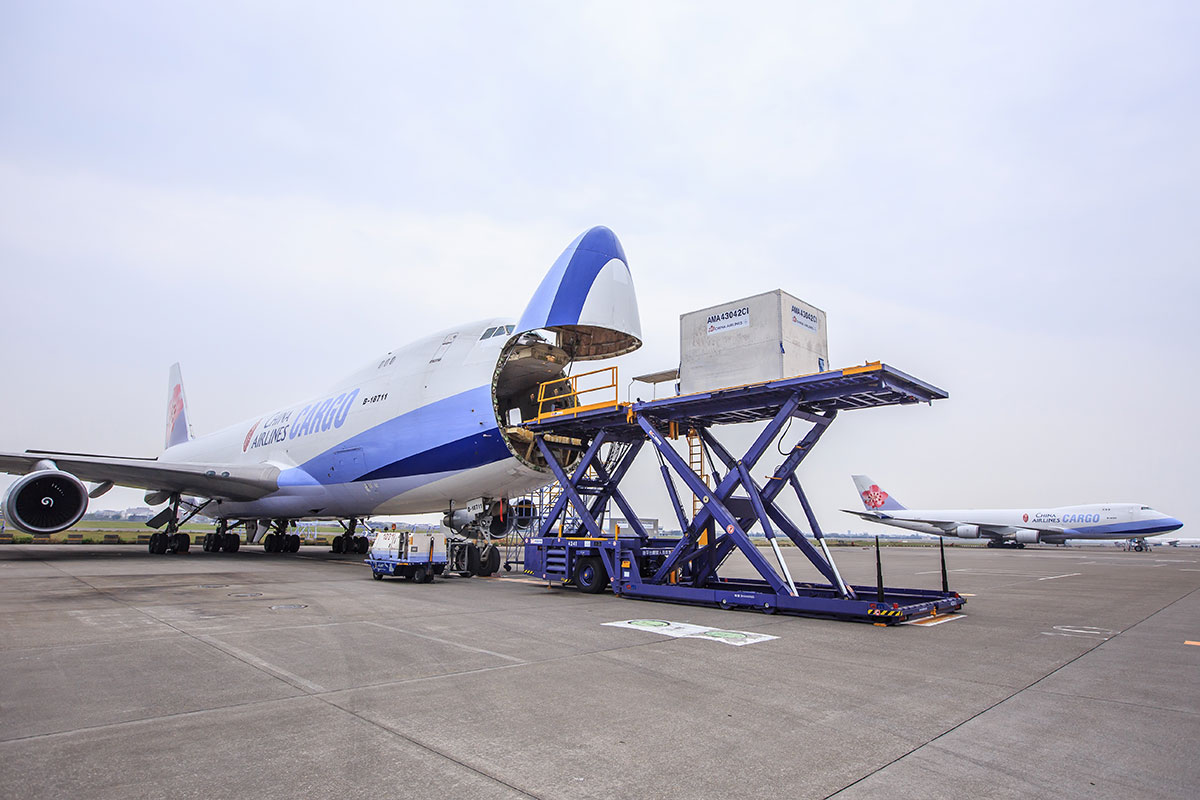2021 proved a record-setting year for the China Airlines Cargo team. Even as the impact of COVID-19 was felt all around the world, China Airlines switched to a cargo-centric business model that put its fleet of 21 freighters to full use. The non-stop movement of cargo kept the economic lifeblood of Taiwan and the world flowing. Some of the records set by Cargo in 2021 included making over a hundred cargo charter flights in one month, surpassing TWD 15.4 billion in single-month cargo revenues in December, exceeding TWD 10 billion in cargo revenues for five consecutive months, and sweeping past TWD 100 billion in cargo revenues for the entire year. 2021 was in fact the best-ever year in Cargo's 62-year history.
As national airlines fought to survive, China Airlines’ elite team of 800 cargo employees around the world showed that they were able to aggressively expand the freight network. More than a thousand pilots flying around the clock as well as the full support of maintenance, ground crews and other units saw China Airlines’ Cargo business surge to new heights during the COVID-19 pandemic. Together, a fleet of 21 freighter aircraft including three newly introduced 777F freighters and the existing eighteen 747-400F freighters helped China Airlines strengthen its competitiveness in the air cargo industry. Through team work, Cargo made around 540 freighter flights per month or an average of 120 flights per week. The integration of passenger and freighter capacity along with continued optimization of schedules and connections meant that over a hundred passenger and freighter charter flights were dispatched in a given month. Total revenues broke all past records and single-month cargo revenues of more than TWD 10 billion represented a new peak that boosted China Airlines’ ranking in the global cargo industry.
Since the start of the COVID-19 pandemic, the air cargo market has undergone structural changes. In addition to the transportation of epidemic prevention supplies, China Airlines continues to ensure the continuity of supply for economic growth goods and everyday necessities ranging from auto parts, semiconductor chips to actual vehicles and high-precision wafer machinery. Shortages in sea cargo capacity meant that e-commerce, textile and other industries that traditionally went by sea now relied upon air cargo as well. COVID-19 spurred the rapid growth of the stay-at-home economy and a jump in online shopping. Fitness equipment, vacuum cleaners, gaming consoles, boutique handbag brands, and even machines for mining digital currency are just some of the goods carried aboard cargo charters. China Airlines is continuing to track and respond to the latest market developments through timely adjustments of flight schedules and rosters. Such initiatives ensured China Airlines’ survival amidst the epidemic and generated cargo revenues in excess of TWD 100 billion.
The inability to travel overseas and enjoy gourmet food during the pandemic led to a surge in demand for fresh and perishable goods. The professional cargo team at China Airlines “kept things fresh” for the people of Taiwan by transporting bulk quantities of meats and seafood including Wagyu Beef from Japan, and lobsters from North America and Australia. Dairy products, frozen desserts, fruits and vegetables such as fresh flowers from Kenya in Africa, melons from Hokkaido in Japan, grapes from California in the U.S.A, along with yogurt and honey from Australia were transported as well. China Airlines' world-spanning cargo network is now flying fresh and perishable products from across the world to food lovers in Taiwan.
As the first airline in Taiwan to receive the CEIV Pharma certification for pharmaceutical cold-chain logistics, China Airlines is also known for its professional cold-chain logistics management and transportation experience. In addition to transporting COVID-19 vaccines purchased by Taiwan, China Airlines also successfully delivered vaccines to countries in Southeast Asia and Oceania. More than 75 million doses of COVID-19 weighing over 350 tonnes have been transported to date, demonstrating China Airlines’ spirit of social responsibility and humanitarian assistance. Additionally, the rapid growth of China Airlines’ cold chain transportation business has seen a jump in the use of temperature-controlled containers. In 2021 more than a thousand temperature-controlled containers were transported by China Airlines, which represents a growth of more than 100% compared to that of pre-pandemic levels.
China Airlines was the first airline in Asia to receive a rating outlook of “stable” from S&P Global Company. In the future, China Airlines will continue to focus on its cargo operations, closely monitor developments in the passenger market, and carefully review its passenger market strategy, as it works to maximize its operational profits.
